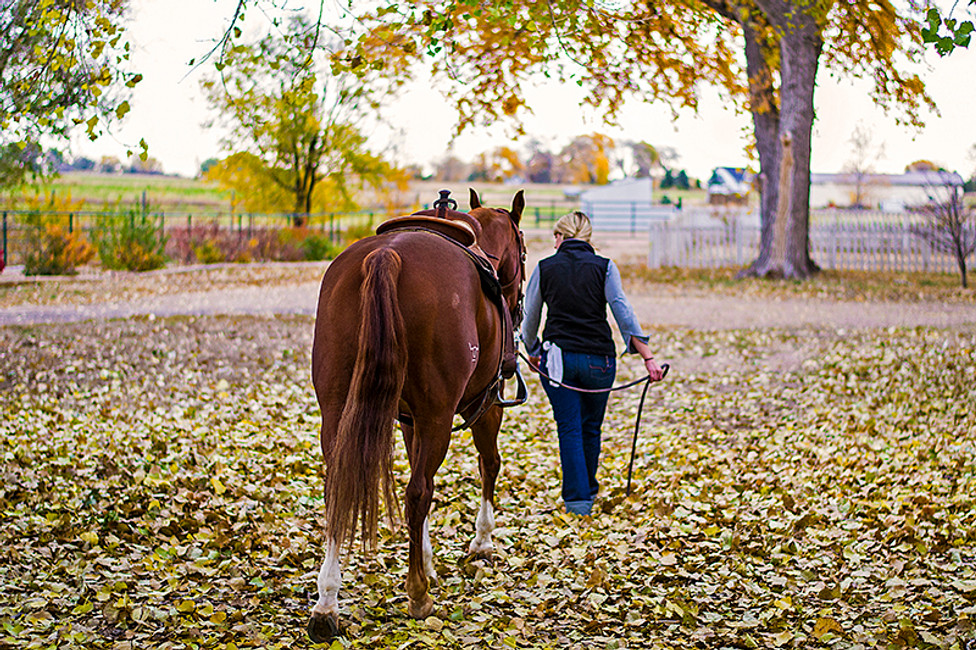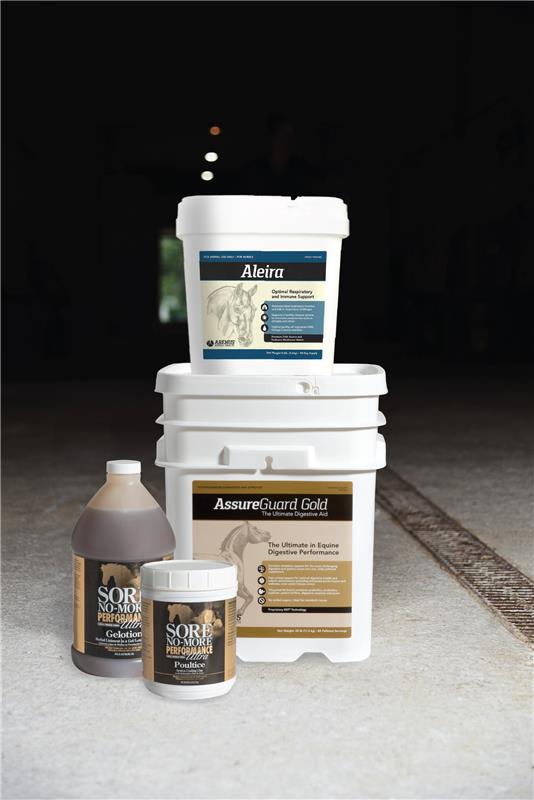
How to Prepare Your Horse for Fall: Management Considerations
Fall is upon us, and with the change in weather comes a new set of equine health care and management challenges. As exciting as the changing leaves and cooler weather may be, it is crucial to keep your horse’s health in mind to prevent any potential problems. Below are several important factors to consider as we enter this transitional season:
Adjust Feed & Exercise Ratios
As pleasant as the crisp breeze in the air can be, the falling temperatures can also lead to a decrease in our ability or desire to ride as often. Because of this, making some small changes to your horse’s management over the cooler months is often necessary.
One of the simplest and most important ways to do that is to cut back on calories. Continuing to feed your horse at the same rate you do during the more active season can cause your horse to pack on the pounds in the off-season. Adjusting your horse’s caloric intake over the winter to stay in line with their reduced activity level will not only keep them healthy but also make it easier to get them back in shape next spring. When you reduce feed, your horse’s micronutrient needs may increase. Consider a year-round vitamin-mineral balancer, such as Eq-Well, to fill in the nutritional gaps that may arise when feeding your horse less grain during the colder months.
Another important consideration, particularly when adjusting caloric intake, is your horse’s weight. During the winter, heavy blankets and long hair coats tend to block an accurate view of your horse’s body condition. Be sure to evaluate this factor on an ongoing basis by removing blankets and running your hands across your horse to critically evaluate whether they are too thin or conversely, overweight. For more insight on your horse’s body condition, have a look at this PDF version of Don Henneke’s nine-point body condition score scale, available for free download through Equus Magazine.
Laminitis & Related Complications
Researchers have noted that horses tend to have a seasonal rise in ACT hormone throughout the fall. This hormone is especially elevated in horses with Cushing’s Disease, which can lead to mild to severe laminitis. In laminitis, the blood flow to the sensitive laminae which connects the hoof wall with the bony structures of the foot is disrupted. This can be quite painful, and, in some cases, horses can develop chronic abscesses due to the condition.
If your horse tends to get repeat abscesses, especially during the fall, it may be time to talk to your vet about whether your horse has chronic, low-grade laminitis. You may also consider a psyllium supplement, such as Assure Guard Gold, which works to support optimal digestive health and balanced blood sugar levels.
Parasite Control
Once the sweltering heat of summer subsides, the number of infective parasite larvae on pastures rises significantly. In most areas, the counts are highest in the autumn months. If pasture quality begins to drop off, your horse may even be eating in grassy areas he would normally avoid, such as manure piles.
It is worth talking to your vet about ways to adjust your deworming schedule to best protect your horse during this time of year. They may recommend the use of a daily dewormer during September and October to help prevent infections.
Pregnant Mares
As your pregnant mare approaches the latter part of gestation, her nutritional needs will change significantly. Her calorie requirements will increase somewhat, but her mineral requirements will rise even more. This poses a unique challenge to balance her delicate nutritional needs without overfeeding or over supplementing.
This is a great time to discuss with your vet or equine nutritionist the best way to adjust your mare’s diet in order to meet her changing requirements. As many developmental bone and joint problems begin while the foal is still in utero, small adjustments to your mare’s mineral intake can make all the difference in producing a quality foal.
Consider talking to our Equine Nutritionist, Brady Karren, and learn how to support your mare’s nutritional needs. Contact him for a free, thirty-minute consultation.
Weaning Preparation
If you find yourself weaning foals during the fall, you may also be administering their first round of vaccinations and worming at the same time. Weaning can be a very stressful process on foals, so scheduling your vet visit for vaccinations and deworming at least 2 weeks prior is a good idea. This can help ensure that the stress of weaning doesn’t interfere with a good immune response to the vaccines.
Changing Pasture Conditions
As growing conditions begin to shift in the fall, the increased number of parasites is not the only danger looming in the grass. As the grass supply begins to reduce, horses will often munch on greener that they would normally leave alone. This leads to an increased risk of plant poisoning. Ensure that you offer supplemental hay to your horses well before the pasture goes bare.
Odds & Ends: Important Chores
Fall is the perfect time to run through and inspect your property, buildings, barns and so forth with winter conditions in mind. Take additional care to make repairs you might have forgotten during the summer riding months and consider fixing anything that could become problematic in the next few months. You may want to think back to last winter and troubleshoot what you could have done better then. Are your blankets in good shape? Have shovels on hand? Need to get a plow for the tractor? Are your water heaters in good condition?

Supplements for Optimal Fall Health
☑ Aleira – Clinically proven respiratory support
Aleira supports optimal equine respiratory and immune health and provides a research backed solution for common lower respiratory ailments in horses like Recurrent Airway Obstruction (RAO) and Inflammatory Airway Disease (IAD).
☑ Assure Guard Gold – Colic prevention & daily digestive support
Assure Guard Gold provides your horse with a constant influx of live microbes and psyllium to manage daily digestive health as well as chronic conditions like colic, sand accumulation, ulcers, diarrhea and poor body condition.
☑ Eq-Well – Year-round vitamin mineral balancer
Developed by Arenus’ very own veterinarians and nutritionists, Eq-Well is formulated for all ages and performance levels; just one vitamin-mineral supplement for every horse in your barn.
☑ Steadfast Equine Growth – Balanced nutrition for growing foals
Steadfast Equine Growth encourages optimal structural development of the fetus and as a foal supplement creates a strong foundation that will prepare your horse for the rigors of athletic performance.

